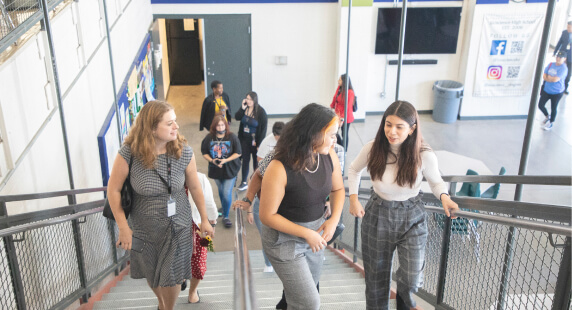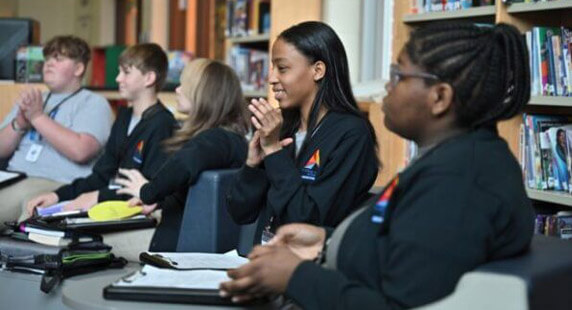As students and teachers head back into the classrooms, they are likely thinking about all they will have to learn and teach, respectively. For math in particular, students may be dreading learning new formulas and procedures. What students do not often recognize is that math is not simply about memorizing, but about being able to improvise and see what could work in a given situation.
Jim Stigler, a psychology professor at UCLA and Carnegie Senior Fellow, describes this as having “flexible expertise.” According to Stigler, flexible expertise provides students the ability to adapt to new situations and solve problems by drawing on previous learning and experiences.
Teachers need to create recurring and sustained exposure to these three key learning opportunities for student success..
Stigler said that for students to gain comfort with this type of approach to mathematics and problem solving generally, teachers need to create recurring and sustained exposure to three key learning opportunities: productive struggle, explicit connections, and deliberate practice. At the Community College Pathways National Forum this summer, Stigler introduced these learning opportunities as essential components in the instructional system that make up Carnegie’s two mathematics pathways. Employed together they can aid students in developing rich knowledge and a focus on problem solving.
Productive Struggle
Stigler explained that while not all struggle is productive, studies have shown that students learn and retain more over time when learning is difficult. Confusion over directions or what question is being asked is simply struggle and not productive. But if teachers can make learning a challenge, students may feel as though they are not simply struggling, but in fact that they are learning deeply. On the other hand, if learning is easy, students may not internalize the material long-term.
Stigler described a study conducted by Roediger and Karpicke in which two groups were given a passage to read. One group had four, five-minute sessions to read and reread the text and the other group had one, five-minute session to read the text and then engage in a form of productive struggle in which they had three, five-minute recall sessions, where they could not look at the text, but were told to write down everything they could remember. At the conclusion, the group that was able to reread multiple times felt they had learned from the passage, while the recall group felt they had not successfully learned it. Although five minutes after the sessions the reread group did slightly better on the content quiz, a week later the group that participated in the recall sessions did significantly better than the group that only reread the text. By making learning an active challenge for students, they are more likely to take the knowledge with them and be comfortable applying it later.
Teachers can help students make connections across what they are learning in different lessons.
Explicit Connections
Often topics seem discrete and disconnected to students as they move from lesson to lesson, but by highlighting the relationships between these ideas, teachers can help structure what students should be thinking about when they encounter unfamiliar problems. Stigler explained that teachers know what they want their students to do, but by focusing on what students should be thinking about, teachers can help students make connections across what they are learning in different lessons. If students have many connections between what they learned, they will have greater ability to retrieve the knowledge they need for any given problem. Using a video from one of University of Michigan Professor Deborah Ball’s mathematics lessons in an elementary school class, Stigler illustrates that leading students in a discussion of all of their answers can provide teachers with the opportunity to draw out the key concepts and make the connections between them.
Deliberate Practice
Often students simply repeat the same type of problems over and over again. Although this is, of course, practice, deliberate practice is different in that students should be challenged to practice analyzing the problem situation and identifying how to solve it, not just repeating the use of procedures and formulas. Relating this type of practice to learning to play the guitar, Stigler recalls how his guitar teacher said that the best guitarists “never practice, but they play all the time.” It is this difference between playing and practice that demonstrates the different between repetitive practice and deliberate practice. Presenting students with problems that give them the opportunity to determine how to approach them and which steps they should take to solve the problem allows students to practice one of the key skills of flexible expertise that they can use when they encounter new, unfamiliar problems.
The three learning opportunities into pedagogy need not be prescriptive.
Stigler says that introducing the three learning opportunities into pedagogy need not be prescriptive. There are countless ways to incorporate these ideas of productive struggle, explicit connections, and deliberate practice into teaching and learning and each situation is different and will require varied employment of the learning opportunities. It is simply important that teachers keep these pedagogical tools in mind as they teach and look for ways to incorporate them into lessons.
Stigler acknowledged the considerable challenges that introducing new practices into teaching presents to teachers, but suggested working with other educators to share ideas and using curriculum and assessments that support this type of learning and teaching. He concluded that “we need to think about [teaching] as not needing to invent it, but working to improve it.”
September 9, 2014
Carnegie has created a network online workspace that serves as the primary access point for all network members. We present four key design principles to improve traditional ways of collaborating and sharing learning online.
September 26, 2014
Panelists at Carnegie’s convening, Using Evidence to Advance Teaching: The Promise of Improvement Science in Networks, discuss how to create a political environment to support and not impede the use of improvement science.






